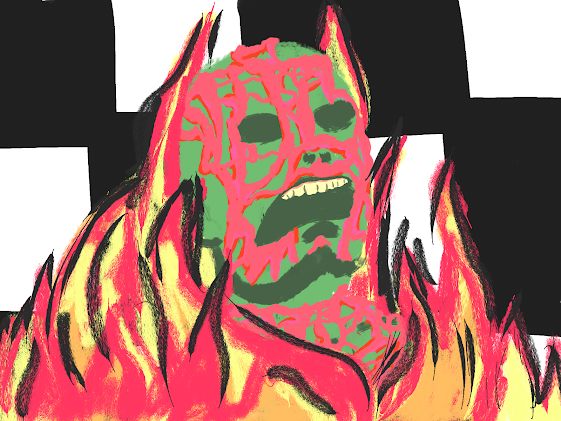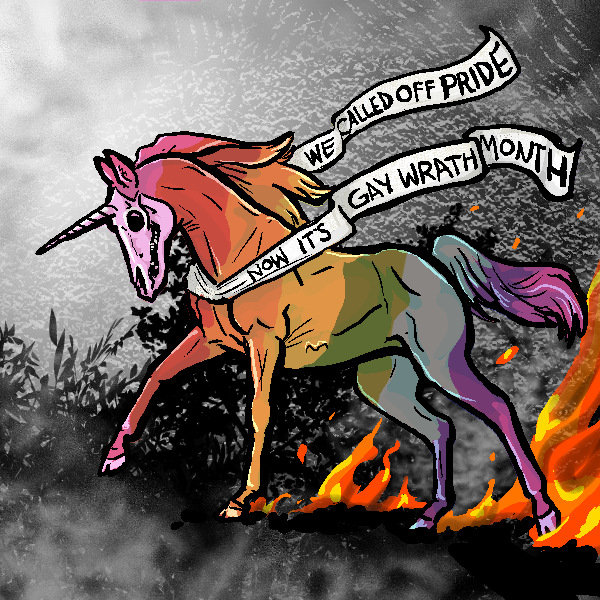Both the EZLN
 and Cuba
and Cuba  like eachother so this is just a fake rivalry made up by people in the west
like eachother so this is just a fake rivalry made up by people in the westYeah, but the EZLN aren’t really anarchists. Neozapatismo is a fusion of anarchism, marxism, and a few other things.
Marxism with Zapotec Characteristics.
zapotecs are from oaxaca, the EZLN is in chiapas so they are mostly maya
Maya was my first instinct but then I went to look around to make sure and I see “Zapotecs” and forget Zapatistas are named for their founder.
regardless of what real parties with actual impact on the world think of each other this is just pablum for terminally online weirdos larping
It really brings my piss to a boil when my identity as a trans and queer person is used in this manner. Almost implying that I can’t be queer because I’m ML. It reminds me of how shitlibs love doing the same sort of thing by basically telling queer that they should support them over the state department’s enemy of the month.
just once i’d like to see communists take power by asking nicely

guillotines in the streets, asking nicely in the sheets
What is it with western leftists and “anti-authoritarianism”?
It smells like just more libertarian fantasy.
Freaking Star Fleet has a central authority and chain of command and that’s about as pie in the sky as we can imagine.
There are loads of reasons, among them western propaganda, but also how so many of the more structured western communist groups either became fed central or just had the leadership taken out. Anarchism is harder to root out not just because the feds are light on it, but also because who are you supposed to assassinate to take them down?
A significant amount of it is also because the big authorities they directly experience and oppose suck. If you oppose the US for it’s authoritarianism, why would you not oppose other places for authoritarianism?
But who opposes the US for its authoritarianism?
Of the multitude of reasons, that’s one of the least in my book. It’s not about authority, it’s about how it’s wielded and against whom.
There’s nothing inherently wrong with authority. It’s about what systems and people it’s protecting. In the case of the US: it’s property and the robber baron class.
People grow to assume that authority where they live is authority everywhere. You grow up your whole life suspicious of American cops, you aren’t likely to think cops are super cool, even if they’re revolutionary and Cuban.
I would say that, under a strong implementation of democratic centralism, assassination is not a significant issue. Previous democratic centralist implementations have a history of being heavy on the centralism, light on the democratic, but if the party line really does come from the bottom up, the leader is only the most effective organizer. They do not need to be a visionary so much as a logistics nerd.
With respect to our anarchist comrades, beyond liberal propaganda about “freedom” (that question-begs a set of assumptions about what freedom is that is basically purpose-built to benefit the bourgeois state), I think Gramsci has useful writing about crasser sorts of anarchists: https://redsails.org/discorso-agli-anarchici/
the marginalized still tremble
oh sorry can’t hear you over colonized people getting autonomy and cultural dignity never experienced under the imperial systems they emerged from
It doesn’t count as liberation unless white people do it for them.
they have it both ways in all cases. russians and jews supporting regional autonomy & “affirmative action” in the USSR? that’s a colonial patriarchal mindset toward the indigenous
the indigenous people do it themselves but choose to associate with the former colonizers? that’s evidence that they are still under the thumb of the Russian Empire.
it doesn’t actually matter to them, it’s just a fucking line. if indigenous rights meant anything to the west [gestures at everything] this wouldn’t fucking be here

Removed by mod
The quote
In the United States, for over a hundred years, the ruling interests tirelessly propagated anticommunism among the populace, until it became more like a religious orthodoxy than a political analysis. During the Cold War, the anticommunist ideological framework could transform any data about existing communist societies into hostile evidence. If the Soviets refused to negotiate a point, they were intransigent and belligerent; if they appeared willing to make concessions, this was but a skillful ploy to put us off our guard. By opposing arms limitations, they would have demonstrated their aggressive intent; but when in fact they supported most armament treaties, it was because they were mendacious and manipulative. If the churches in the USSR were empty, this demonstrated that religion was suppressed; but if the churches were full, this meant the people were rejecting the regime’s atheistic ideology. If the workers went on strike (as happened on infrequent occasions), this was evidence of their alienation from the collectivist system; if they didn’t go on strike, this was because they were intimidated and lacked freedom. A scarcity of consumer goods demonstrated the failure of the economic system; an improvement in consumer supplies meant only that the leaders were attempting to placate a restive population and so maintain a firmer hold over them. If communists in the United States played an important role struggling for the rights of workers, the poor, African-Americans, women, and others, this was only their guileful way of gathering support among disfranchised groups and gaining power for themselves. How one gained power by fighting for the rights of powerless groups was never explained. What we are dealing with is a nonfalsifiable orthodoxy, so assiduously marketed by the ruling interests that it affected people across the entire political spectrum.
– Michael Parenti, Blackshirts And Reds
I am a bot, and this action was performed automatically. Please contact the admins of this instance if you have any questions or concerns.
like actually where do these fucking people get off the reason i’m a communist is because i studied and examined the way the socialist states have treated women and cultural minorities, it’s fucking absurd
We need to ban discussion of this shit, it’s just using bad takes by random internet anarchists as excuses to do digs at other anarchists. I’m not an anarchist at all but it makes me really angry
peace deal, we’re allowed to make fun of the weirdo “abolish time” anarchists and they’re allowed to make fun of the weirdo “i pledge allegience to chairman gonzalo” communists, and we will build anticapitalist unity on this basis. as a show of good faith we won’t make any more jabs about Makhno and they won’t make any more about the Bolsheviks
I’m an ML and I believe in abolishing time
The kkklocks are kkkulakkks
The clocks have had it too good for too long.
Pockets and the watches contained therein are bourgeois. Retvrn to haversack.
If you can’t fit your whole life in a bag on a stick you’re bourgeois.
time abolition is the correct line actually. i assure you the redditor who made this image is not that cool.
That’s not a fair deal because most ML’s genuinely dislike Gonzalo, while this meme, although cringe, still states partially what anarchists fundamentally believe (they do not like the state, regardless of its class character)
That’s exactly what every post of shit like this is and it really pisses me off
Yeah, kind of agree
Always have been.
aS An aNaRcHiSt I think most of these kinds of “baby leftist” narkies can be educated, kicking and screaming, but something about “solarpunks” specifically makes me spit yellow bile. Like cool, you’re all in on industrial society, but also against planned economies, so you’re just a liberal who like anime. You do not have a politics, you have an aesthetics, and one informed by your settler fantasy of techno-agrarian self-reliance.
This does not affect what I said whatsoever
“Why yes, I do reject a transitionary state due to its contradictions with my ‘anti-authoritarian’ principles, why do you ask?”

AES more like AESthetic
“Let the ruling classes tremble at a communistic revolution” is an absolutely good take which most anarchists have.
Imma tread delicately here but using the CNT/FAI as an example of a classless, moneyless, stateless, anti-authoritarian society doesn’t fit with a historically-grounded view of Revolutionary Catalonia and the larger Spanish Republic. At all.
You might take issue with this and say that it’s unfair to expect a revolutionary movement under the conditions of open civil war against the forces of fascism to achieve their vision of statelessness and an anti-authoritarian society and I’d agree but… that’s why I see seizing the state as an absolute necessity and not as optional.
I don’t believe that any revolution is above criticism and I also hold the position that there are going to be excesses. I don’t want to see them, I don’t like to see them, but they are going to happen and if we don’t have a ruthless criticism of all that exists then we will inevitably end up liable to repeat these excesses the next time around but we are also inclined to atrocity denialism etc. etc.
I’m going to avoid discussing the broader implications for the Spanish Republic and my ideological position on this stuff because I don’t want to instigate any slapfights.
In the Spanish Republic, it’s an undeniable fact that the Catholic church was targeted and subjected to a campaign of persecution. At certain points clergy were burnt alive inside their churches. Clergy were also simply executed. Skirting around the editorial commentary, this constitutes genocide in the formal definition.
A sorely overlooked facet of the history of the Republic is when a Moroccan delegation from the Spanish colonial holdings in Morocco sued the Republican government for independence, on favourable terms for the Republic. This was rejected. Even if the terms for independence were accepted with the exact terms given the Moroccan delegation, there would still have existed a very clear colonial hierarchy.
I will largely skip over military and government structures because that’s all pretty obvious and most of it can be inferred.
The Republic operated forced labour camps.
The government took measures to nationalise infrastructure and struggled to do so especially with their electricity grid. To be clear, I think that a modern state especially under conditions of war must have national control over critical infrastructure like electricity. But doing so is an inherently authoritarian measure.
Likewise there were efforts at forced collectivisation of farms.
The CNT/FAI operated “Control Patrols”'; a sort of de facto police force which had a repressive character and was infamous for arbitrary arrests and summary executions by firing squad, as well as for refusing to be accountable to the government structures of the Republic.
In CNT controlled Puigcerdá, there was significant corruption and its mayor enforced collectivisation but continued to farm his own livestock privately. Puigcerdá was a hotbed of espionage and falsified passports due to its location and issues within its government.
The CNT-UGT collectivised telephone infrastructure and controlled the Catalonian telephone exchange. When military command sought to coordinate with the government via telephone, one particular call was interrupted by an exchange worker saying that there is no government but only a Defence Committee. When the President of the Government of Catalonia was speaking to the President of the Spanish Republic via phonecall, the call was interrupted midway by a phone operator who said that the phone lines should be used for more important purposes than talk between presidents. It was a widely-held view that this telephone exchange closely surveilled calls made through it and it’s pretty obvious why that is.
On the ground level, the government took a very dim view of what they considered to be vice and took steps to discourage and curb it.
In factories, the Spanish Republic struggled desperately to balance the needs of war production against the demands of workers and their ideological positions. Ultimately this led to establishing far better terms for labour which often saw a precipitous drop in productivity and in response a course-correction of stripping workers’ rights and a program of enforcing labour discipline as an attempt to meet production requirements. The most obvious example of enforcement of labour discipline was the establishment of the role of Distributor of Tasks. This was a government official who answered only to the highest levels of government and who had vast discretionary powers over workers. Workers who were not sufficiently productive, who were deemed absent without just cause, who were late to work too often, and who showed a defeatist attitude or a lack of revolutionary zeal could be sanctioned by the Distributor of Tasks and even imprisoned.
All workers were required to maintain a sort of journal of their employment history where their employers would record critical information about the worker’s work and their general character. This record was necessary for finding work. It can be inferred that being fired by a Distributor of Tasks or being sanctioned would make finding future employment extremely difficult.
In CNT/FAI administered regions, workers were paid in labour vouchers redeemable in their local village. To travel outside of your village required exchanging your labour vouchers for currency, which could only occur with the express permission of the council. You were required to provide an explanation for what you were going to spend your money on. This effectively meant that free movement of people was strictly controlled and monitored.
Ultimately it was the anti-communist coup would spell the end of the Spanish Republic.
To sum up with the purpose of this comment, there’s a major problem in taking a team-sports mentality and projecting it onto history because you end up in what amounts to campism.
It irks me that the kind of person who posts this kind of image is the same kind of person who will level unprincipled criticisms of communists as being campists and of having a political orientation that amounts to being on the side that is anti-USA, that communists support the same repressive structures as long as it comes with different aesthetics, that they worship the state uncritically, and that they are apologists for atrocities, and that their only defence when faced with the excesses of the movements they uphold in history is whataboutism. (I believe that these people do exist btw, it’s just not as common as it’s made out to be.) The reason why this irks me is that all of these criticisms apply equally to unprincipled anarchists who engage in this sort of sectarian bickering.
I could create similar lists of criticisms of the actions of governments like the USSR, Cuba, and the communist faction of the Spanish Republic, for example, and I would be able to make these criticisms principled through a political analysis which I’ve largely avoided above because I wanted to illustrate a point about how some people engage with history through a primarily ideological lens and what implications that has for the consistency of how they apply their politics.
I wonder if the people who post these kinds of memes would be able to provide any principled criticism of the CNT/FAI, the YPG, or the EZLN?
Doesn’t genocide refer to the targeted prosecution of an ethnic group? Clergy are not one, so why does their prosecution constitute a (formal) genocide?
You’re not wrong and I should have been more precise in what I said there.
Under the UN and the ICC genocide doesn’t cleave to the strict etymological meaning of killing a race of people but it includes certain acts committed with intent to destroy, in whole or in part, a national, ethnical, racial or religious group.
It’s one of those terms that have expanded beyond their strict definition, so like forcibly taking children from an ethnic group and placing them in residential schools isn’t the act of killing of anyone and as such it doesn’t meet that definition but it’s still recognised as genocidal in legal definitions, as it should be.
I knew about the expanded scope (e.g removing children from their families) but not that it included religious groups.
It must include religious groups or it isn’t congruent and you could argue your way out of the charge of genocide against ethnoreligious groups like Yazidis or Jews and it would muddy the waters when discussing the ethnic cleansing of minority groups differentiated primarily from the majority by their religion.
The problem with the argument here is not that genocide does not include actions intent to kill a religious group, but that this was not happeningArticle 6 is about genocide. Article 7 is about crimes against humanity, including ethnic cleansing:
Article 7 (1) (d)
Crime against humanity of deportation or forcible transfer of population
Elements
-
The perpetrator deported or forcibly transferred, without grounds permitted under international law, one or more persons to another State or location, by expulsion or other coercive acts.
-
Such person or persons were lawfully present in the area from which they were so deported or transferred.
The reason why religious groups is included in the definition of genocide is not because otherwise “it would muddy the waters when discussing the ethnic cleansing of minority groups differentiated primarily from the majority by their religion”.
The only one who is muddying the waters here is the person who thinks they know international law well enough that they can provide commentary on it without being familiar with the international law they’re talking about.
Why do you think they needed to add extra information in about religious groups to the definition of genocide when ethnic cleansing:
a) Does not in itself meet the definition of genocide
b) Has its own separate article to define what ethnic cleansing is?
Looking forward to the insults in your next smuglord reply.
I got confused at this reply. You say that ethnic cleansing does not meet the definition of genocide, but in your previous comment you said that
Under the UN and the ICC genocide doesn’t cleave to the strict etymological meaning of killing a race of people but it includes certain acts committed with intent to destroy, in whole or in part, a national, ethnical, racial or religious group.
Isn’t your example of taking children away an act with the intent of destroying a group, and therefore genocide? But then you mention that it’s ethnic cleansing, which is a superset (instead of a subset) of genocide.
Can you clarify? When is an ethnic cleansing not a genocide? I thought it was synonymous. Also, why are religious groups included in the definition of genocide if not for the reason the commenter you’re replying to mentioned?
You’re all good, I was skipping over the specific actions they list as being genocide but it is a bit unwieldy so I trimmed it down to “certain acts” make my reply a bit more concise.
The full text is
Genocide means any of the following acts committed with intent to destroy, in whole or in part, a national, ethnical, racial or religious group, as such:
(a) Killing members of the group; (b) Causing serious bodily or mental harm to members of the group; © Deliberately inflicting on the group conditions of life calculated to bring about its physical destruction in whole or in part; (d) Imposing measures intended to prevent births within the group; (e) Forcibly transferring children of the group to another group.
So by forcing a group to transfer their children to another group (e.g. stealing the kids of one religion and relocating them to a different religious group or taking the children of indigenous peoples in Canada and putting them in residential schools) you are cutting the children’s ties to their group of origin, which is basically to crush their cultural heritage and/or to “breed them out”.
If people aren’t allowed to propagate their cultural heritage and pass it down to their children, with things like language and food and dress, then it’s a way of doing genocide by less direct methods than straight-up killing them because the intent is to take a race of people and, perhaps in a generation or two, to have people with black skin who are culturally entirely the same as the white population, for example.
Same for taking their kids and putting them where they aren’t going to procreate with someone from within their own group - you aren’t killing anyone but you’re essentially diluting their ethnic group out of existence.
It’s worth mentioning that this usually happens in tandem and not in isolation.
The UN definition of ethnic cleansing doesn’t actually exist under that name but it’s known as the crime against humanity of deportation or forcible transfer of population. (This also explicitly refers to forcible displacement.)
This is where it gets confusing and the media and mainstream discourse makes it even more confusing.
So you know how “purges” mean expulsion from the party in a formal sense, almost always in reference to communist parties, but people talk about purges in the sense that it’s a euphemism for being executed by the state?
Ethnic cleansing is one of those terms. Some people who were purged were also executed but not all of them.
Ethnic cleansing often happens under conditions of war or civil war, but not exclusively. What this means is that, like with some purges, you can get a lot of killing or death and these deaths are used to ethnically cleanse an area by making the rest of the group flee, or an area gets ethnically cleansed and then direct evidence of genocide is established later on. You also get an ethnic cleansing that itself causes mass deaths thus also making it genocidal, like the Trail of Tears. So in effect people hear ethnic cleansing alongside genocide so often that it blurs and becomes a sort of euphemism for genocide. Which tbh is pretty understandable.
When is an ethnic cleansing not a genocide?
So that would be where a government rounds up the people in an area and forces them to leave their homes or territory but without killing them, to give a simple and straightforward answer. (But it could mean something like cutting off a water supply to a region so that the people are forced to move.)
It gets more hypothetical because the definition of genocide per international law doesn’t set a number of deaths that you need to achieve before you are committing genocide but rather it looks at intent and action, and most historical examples of forcible transfer of population come with deaths as some people choose to resist which leads to killings. So if the government says “Clear the lot of them out, kill them if you have to” to the military or the police or a group like paramilitaries or gangs and they resort to killing some of the people who are being forcibly relocated then that’s going to qualify as genocide.
If the government says “Clear the lot of them out but don’t kill them” and one or more of that group resist and die in the process due to use of force then it’s forcible relocation but not genocide. (Unless there’s an order given by the leader of the forces and it can be established through witness testimony or some other evidence, then that leader is guilty of genocide but the government that issued the order to forcibly relocate them is not.)
A lot of this comes down to how the law functions.
If you have a law for murder but you don’t have one for manslaughter then a lot of murderers will get off free because there’s insufficient evidence to establish that the killing was premeditated, even if it was actually premeditated.
If genocide includes ethnic groups but it excludes religious groups then you’re creating a legal loophole where a government can say “Kill all the… Muslims” and then when they get brought up on charges in the ICC they can show all the evidence that they never meant to kill all the Arabs (wink, wink) - it was just all the Muslims!
If the definition of genocide requires that a government issues the orders to the military then governments will just use paramilitaries instead and they’ll use the loophole. Or the government will issue orders to the military by saying “I don’t want a single person from that group left in that region” and the government won’t be liable for actual genocide, even though the military is going to do what the military does and shoot people, so without having forcible relocation as a sort of back-up “manslaughter” charge then the government will get away with it.
This also explains why there aren’t specific numbers attached to genocide or forcible relocation - because if it was set at 500 then governments would issue an order but limit it to 450 people and then the government would smile coyly and shrug their shoulders at the judge.
Often things like genocide can be extremely difficult to establish evidence for, or at least they used to be before modern technology. There might have only been footage of an armed group killing one single person before the person with a videocamera fled or was knocked to the ground but that footage along with the testimony of survivors might be deemed sufficient as evidence of genocide because the court can directly link one death of the targeted group to whoever carried out the genocide.
I hope that makes more sense now.
It gets really, really specific and intensely debated. This is also why I haven’t dug deeper into the details because you could bathe a group of Muslims in pig blood for example and, if you go into the elements of genocide by by causing serious bodily or mental harm, as the UN defines it, then you’re probably getting really damn close to the mark without actually killing a single person especially if it’s done repeatedly or it’s part of an established and proven pattern of inflicting mental harm on that same group of Muslims or other Muslims.
Like it or hate it, this is why there’s so much work that goes into writing laws and interpreting laws and enforcing them. This is why legal studies and religious studies exist - you start with a simple law or commandment like “Do not kill” and then it becomes:
“…humans”
“…except in self-defence”
“…unless you used unreasonable force”
“…or if you had reasonable suspicion to believe that your life was under imminent threat, even if it is proven to be false later like if they convinced you that they were going to stab you but they were concealing a stick to make it look like a weapon”
“…or in war”
“…or if you are killing someone who is in extreme suffering that cannot be reasonably expected to be relieved”
“…except if they don’t want to die”
“…except when they are unable to express their desire to die but their extreme suffering can be proven”
“…unless the person intended to cause harm to others by killing that person who is in extreme suffering”
“…or if there is a prohibition on killing that person (see: other law/religious edict)”
And it just goes on. And on. And on.
You aren’t worth more of my time. Delete your fucking account.
What a courageous response!
You can’t back up your position, you can’t argue a point, you clearly haven’t done the reading, and when you get called out for your bullshit in a way that’s completely incontrovertible you can’t even admit that you’re wrong.
All you can do is attack people that you disagree with. You’re boring.
-
It fucking doesn’t. It especially fucking doesn’t when the clergy were active participants in the civil war on the side of the fascists.
Yep. Some of the clergy absolutely were active participants in the civil war on the side of the fascists.
Your comment illustrates exactly why religious groups are included in the legal definition of genocide and it dovetails directly into legal stuff on collective punishment.
Look, I’m not going to armchair quarterback history and I’m not about to defend the legacy of the Catholic church or historians like Preston or Beevor but what I have illustrated in broad brushstrokes above is there is a idealised notion of an immaculate revolution that some people blindly cling to while they hypocritically denounce the excesses of other revolutions which they deem to be from the wrong team.
I explicitly avoided discussing matters like the checas and the assassination of the journalist Josep Maria Planes i Martí by the FAI forces (because they didn’t appreciate his investigative journalism into the links between anarchists and organised crime in his work Els Gàngsters de Barcelona) because of the likelihood of inciting partisan bickering by talking about it and because this stuff requires people to actually dig into the historical scholarship surrounding these events and you can’t arrive at a position on the matter especially from English-language historical sources by just reading one author - it requires a historiographical approach to the literature because most of the major historians are libs.
In the same way that I don’t engage in discussions with people who invoke the Kronstadt Rebellion or the Great Purge or the execution of the Romanovs with people who don’t understand anything beyond the name of the event and the spoonfed, boogeyman narratives about them, I don’t engage with discussions about the details of the Spanish Civil War because people approach these moments in history as static, isolated moments with a partisan lens and they make their minds up about what happened before they even understand what happened and the context surrounding it.
The point of my comment isn’t about arguing that the good side was actually bad and the bad guys were really the good guys. That’s the one of the exact mentalities that I reject, and I’m trying to illustrate the lack of engagement with history when people fall into this way of thinking.
The original meme was clearly made by the type of person who is ideology-first when engaging in history: communist bad, anarchist good therefore whatever communists did was bad and whatever anarchists did was good.
A deeper level of this same mentality is to engage with history but to then retreat to an ideological position: Catholic church bad therefore whatever was inflicted upon the Catholic church is good.
That’s still a problematic way of approaching history. It’s still idealism, inherently.
If you’re going to be a historical materialist then you need to engage with history on the terms of history and then to develop a political ideology from that point. Marx didn’t start Capital from the position of “Capitalism bad therefore everything capitalism does is bad”, far from it, and he also didn’t start with the position of “Capitalism bad therefore whatever opposes it or seeks to replace it is good”. He started by examining capitalism as it functions and developed political analysis from that place.
If you aren’t able to hold that two things can be true at once then you aren’t going to get very far.
Was the assassination of Planes by the FAI bad? Yes.
Was the assassination a violation of anarchist political principles? Yes.
Was the assassination a political necessity? Maybe. I know that I don’t know enough to come to a conclusion on that.
Were the deep connections between the FAI and organised crime bad? Yes.
Were these connections a political necessity? Yes.
Were the conditions that produced these political connections bad? Yes.
Was the overthrow of the system and the conditions which produced these political connections by the FAI good? Yes.
Good guys do bad things, bad guys do good things. This is even more true when you expand that to groups such as organisations.
Did the clergy in Spain actively participate on the side of the fascists? Yes.
Did all of the clergy in Spain actively participate on the side of the Fascists? No.
Was the suppression of the Catholic church a political necessity? Yes.
Was it a political necessity to burn clergy alive in their churches? No.
Did every member of the clergy who was killed by the Republic deserve to die?
I don’t know enough to make that call but you’d have an easier time convincing me that there were people who were killed that were essentially innocent than you would convincing me that no innocent clergy were killed, especially if we draw upon historical scholarship surrounding this.
Soup for brains, your claim was not merely that there are complexities to the issue of violent reprisals towards a cultural institution, but that it was genocide. The answer to that is that it fucking isn’t.
I don’t really care if you disagree with the modern definition of genocide as established in international law and plenty of examples of national law. That’s your prerogative. As is whether you agree or disagree with the persecution itself. The contents of your head aren’t my concern.
It does meet the definition of genocide though.
Does the UN & ICC definition of genocide state that “Genocide means any… acts committed with intent to destroy, in whole or in part, a national, ethnical, racial or religious group, as such killing members of the group”?
Were the members of the clergy killed by people in the Spanish Republic targeting a religious group with the intent of destroying it?
Were FAI defence committees operating ghost cars that targeted clergy for assassination using blacklists?
No it doesn’t, you’re just wrong. People were not targeted for being catholic, but for being part of an institution that was feeding kill lists to fascists and had participated in the systematic repression of people for centuries. No one but you considers this a genocide. I am not arguing with the UN, international law, or scholars, I’m arguing with one person who has soup for brains.
People were not targeted for being catholic, but for being part of an institution
People weren’t being targeted for being catholic, they were being targeted for being catholic religious leaders. Okay?
I guess it must have felt really important for you to make that distinction.
I am not arguing with the UN, international law, or scholars, I’m arguing with one person who has soup for brains.
I said that it meets the definition of genocide. I have provided the definition of genocide that I’m referring to.
You can’t tell the difference between a statement of fact and a statement of opinion. I literally said “skirting around the editorial commentary, this meets the formal definition of genocide” to say that I’m not engaging in statements of opinion on this.
The point was obviously lost on you there.
If I said “The execution of the Romanov family by the Bolsheviks meets the formal definition of regicide” do you think I’m saying “I personally condemn the act of executing the Tsar” or do you think I’m saying “This act met the criteria for regicide”?
I’m arguing with one person who has soup for brains.
You’re shadow-boxing and you’ve convinced yourself that you’re actually engaging in argumentation.
deleted by creator
Clergy is not a class.
You can call yourself a Marxist or you can call clergy a class but you can’t do both.
It isn’t even that guys. During the entirety of the red terror somewhere between 6000 and 7000 clergy were killed according to sources sympathetic to the fucking nationalists, and that’s counting women religious, monks and priests. The priests were part of the white terror that killed over a quarter of a million people in violent political purges.
deleted by creator
It wasn’t classicide.
In the Spanish Republic, it’s an undeniable fact that the Catholic church was targeted and subjected to a campaign of persecution. At certain points clergy were burnt alive inside their churches. Clergy were also simply executed. Skirting around the editorial commentary, this constitutes genocide in the formal definition
Absolute baby brained nonsense. Not reading any more after that absolute embarrassment of a statement. Nope. Fuck off.
Guys nooo, you can’t target the fascists for violent reprisal, you have to let them murder you nooooo
So you’re going to tell me that every member of the Catholic church in the Spanish Civil War was a fascist who was killing the people fighting on the side of the Spanish Republic?
I can give you examples of when Catholic clergy attacked people on the Republican side. Can you?
If you’re going to accuse me of having a baby-brained take then give me your biggest brain take on why the Catalan Generalitat put in extensive effort to protect Catholic clergy.
Was the Generalitat defending fascism?
Have you got a better source on this than Lawrence Fernsworth which I haven’t come across, one that disproves that the Generalitat protected the clergy?
How do you feel about the protection extended to the Franscan monks by basically all of the Republic? Why would everyone go defend fascists like that?
But try not to use too many sources because I’ve only got a little, tiny baby-brain so let’s agree to keep it to just 3-4 or otherwise I won’t be able to keep up with you and your big brain and all that history reading you must have been able to do with it.
Or you can take your own advice and just fuck right off.
I’m going to tell you that it isn’t genocide to target an institution that is openly siding with a fascist regime trying to murder you, actually. The fact that people have a strong attachment towards a major cultural institution doesn’t change that one iota. You are the one sitting on a massive burden of proof here that you absolutely do not engage with, instead doing the most obvious motte and bailey bullshit ever seen on the internet.
Yeah, tell me more about motte and bailey bullshit.
I have explained that it meets the definition of genocide.
Now you’re saying that you don’t think it’s genocide but you’ve retreated from the point about it meeting the formal definition of genocide to a point that it doesn’t meet your personal definition of genocide.
There’s a term for that.
You’ve retreated from the point that killing clergy isn’t genocide to the point that targeting an institution isn’t genocide.
There’s a term for that too.
The fact that people have a strong attachment towards a major cultural institution doesn’t change that one iota.
Okay. Who is arguing that? How does this point change the fact that these actions meet the definition of genocide?
You are the one sitting on a massive burden of proof here
Is this your way of asking for a source?
You’re doing your best imitation of a Redditor wringing your hands and using debatebro terms and being as edgy as possible, you ignore anything that I have said which is inconvenient to your argument, and you throw a whole bunch of stuff at me that you expect me to answer while you dodge any questions that I ask you.
If you can’t find it in you to have an actual discussion then, as I said before, take your own advice and fuck right off.
There is no discussion to be had, you’re wrong. You’re not the target of dishonest argumentation, you’re just arguing something stupid, badly. I have not retreated from anything, I have called you an idiot and wrong, and I stand by that because you are.
 whataboutism
whataboutism 
Didn’t the EZLN basically just rebuild their whole organizing structure to be more Leninist?
Me when a member of the ruling class trembles

Marxist-Leninist in the streets, an anarchist in the sheets

What even is an “anti authoritarian society”?
I always thought the point of anarchism was to have a stateless society with the removal of unjust hierarchies, not a society with zero authority… Revolution is an exercise of authority in itself, in that the proletariat forces their class interests over that of the bourgeoisie. An anarchist revolution would also do this. As seen by the syndicalists in 1930s Spain.
i’m unironically both of these
The trick is communists still believe the end goal is anarchism, lol. I just think we need a little authoritarian proletariat army and organization first, as a treat. Whereas if i was a pure anarchist i would reject that. I’d actually be good with either way of getting out of capitalism, uncritical support to defeating the Great Satan that is amerikkka
The zapatistas are kinda both too

























